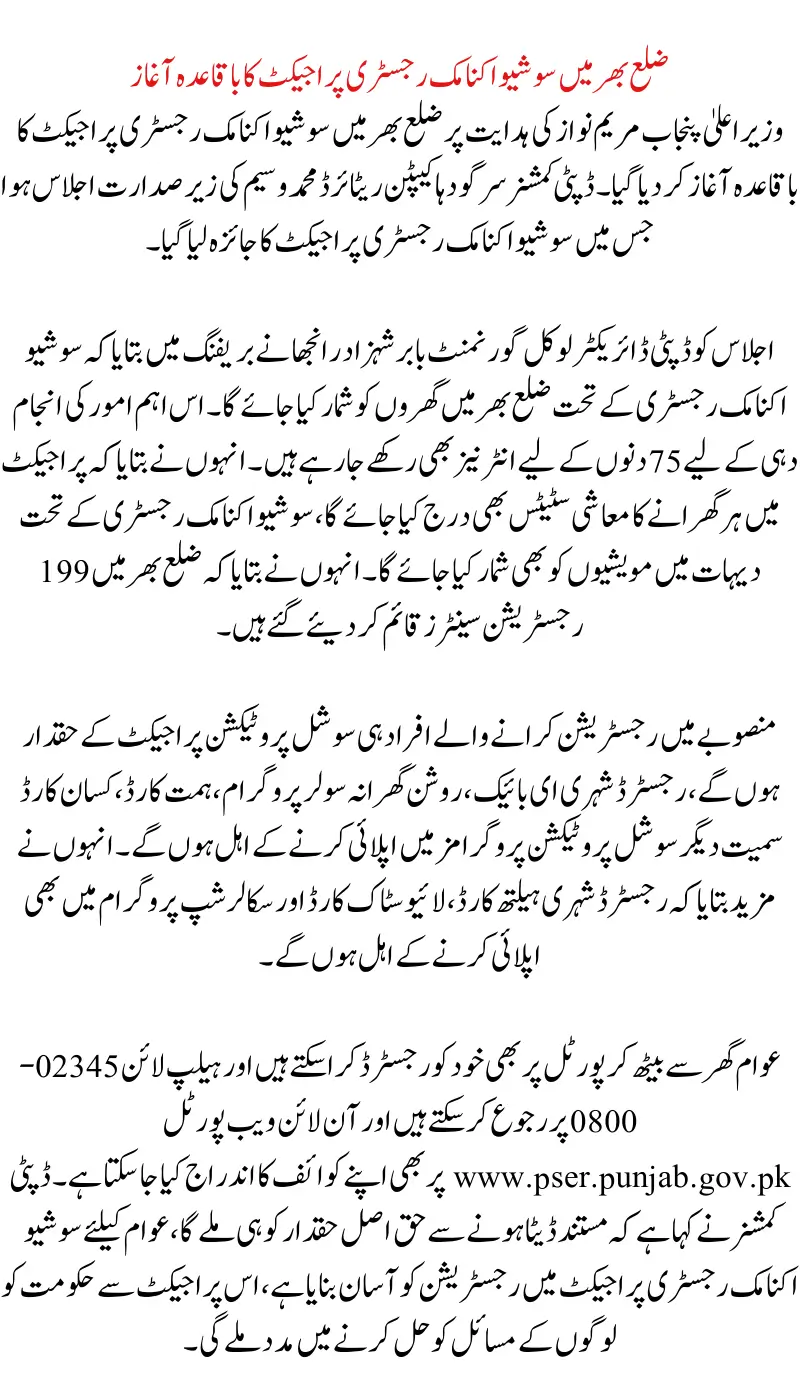The Punjab government has officially launched the Punjab Socio-Economic Registry (PSER) Project under the leadership of Chief Minister Maryam Nawaz. This initiative aims to create a comprehensive database of households across the province, ensuring that welfare benefits reach the deserving segments of society. Through this registry, economic conditions of families will be assessed, and villages will also have their livestock counted.
To execute this project efficiently, interns are being hired for a 75-day period, and 199 registration centers have been set up across Punjab. Citizens can register at these centers, through an online portal, or via a dedicated helpline. This initiative is a significant step toward inclusive development and efficient allocation of resources.
Comprehensive Data Collection for Targeted Welfare
Purpose of the PSER Project
The PSER Project is designed to collect accurate socio-economic data of households to facilitate better decision-making and welfare distribution. By registering in this system, families will be able to access various government assistance programs, ensuring that financial aid, health benefits, and other social services are allocated to the right individuals.
Key Data Collection Areas
The project focuses on collecting the following data:
- Household economic conditions
- Employment status of family members
- Ownership of assets and livestock in rural areas
- Eligibility for government assistance programs
By gathering such critical information, the government can improve its welfare policies and extend support where it is needed the most.
Government’s Commitment to Social Welfare
Efforts to Facilitate Citizens
To make the registration process smooth and accessible, the government has established 199 registration centers across Punjab. Additionally, for those unfamiliar with online registration, PSER representatives are available in every tehsil to assist citizens.
Deputy Commissioner Captain (R) Mohammad Wasim has emphasized the importance of accurate data collection, stating that it will ensure fair and transparent distribution of welfare benefits. Assistant Commissioners have been directed to provide necessary support to citizens visiting registration centers.
Eligibility for Social Welfare Programs
Access to Key Welfare Initiatives
Citizens who register under the Punjab Socio-Economic Registry will be eligible for multiple government programs, including:
- E-bike Scheme – A program providing electric bikes to students and workers.
- Roshan Gharana Solar Program – Solar power solutions for households.
- Himmat Card – A support initiative for differently-abled individuals.
- Kisan Card – Financial assistance for farmers.
- Health Card – Free medical treatment for low-income families.
- Livestock Card – Benefits for rural farmers managing livestock.
- Scholarship Programs – Educational support for deserving students.
By registering with PSER, citizens gain access to government incentives that help improve their living standards.

Step-by-Step Registration Process
How to Register for PSER?
The registration process has been simplified to ensure maximum participation. Citizens can register through the following means:
- Online Registration – Visit the official PSER portal at www.pser.punjab.gov.pk and complete the registration form.
- Physical Registration Centers – Visit the nearest PSER registration center for assistance.
- Helpline Support – Call 02345-0800 for guidance regarding the registration process.
Additionally, interns have been hired for 75 days to assist citizens in registering seamlessly.
Registration Deadline for Welfare Programs
The last date to register for the Punjab Ramadan Guardian Program is February 15, 2025. Citizens are advised to complete their registration before the deadline to ensure eligibility for welfare benefits.
Also Read: CM Maryam Nawaz Launches “Agriculture Tubewell Solarization Project 2025”
Impact on Punjab’s Socio-Economic Landscape
The PSER project is a game-changer in Punjab’s socio-economic development. By ensuring data-driven decision-making, the government can:
- Provide targeted financial aid to those in need.
- Improve healthcare accessibility through the Health Card program.
- Promote education through scholarships.
- Support farmers and rural communities via the Kisan Card and Livestock Card.
With a transparent approach and efficient registration system, this initiative aims to bring long-term socio-economic stability to Punjab.
Conclusion
The Punjab Socio-Economic Registry (PSER) Project is a landmark initiative designed to improve resource allocation and welfare distribution across Punjab. By registering in this system, citizens can benefit from multiple government programs, ensuring financial security, education, healthcare, and employment opportunities.
With a user-friendly registration process, 199 centers, and dedicated interns, the project ensures that every household in Punjab has the opportunity to secure government assistance. This initiative marks a new era of development, prioritizing social welfare, economic stability, and inclusive growth for all.

